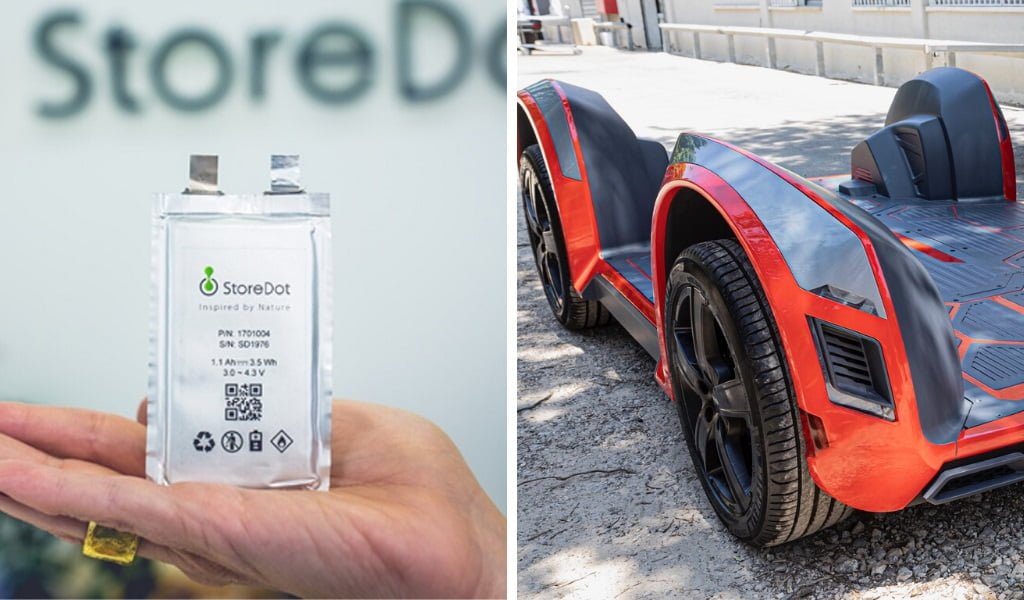Israeli companies StoreDot, the developer of fast-charging batteries (the aim is five minutes) for electric vehicles, mobile devices, and next-gen LCD displays, and REE, a company that is reinventing vehicles, were both recognized as Bloomberg New Energy Finance (BNEF) Pioneers for 2020.
The two Israeli companies were named among 10 winning firms worldwide “pursuing some of the most exciting opportunities in areas as diverse as advanced materials, distributed energy, industrial digitalization, intelligent mobility, metals, satellites, and energy storage,” according to BloombergNEF (BNEF), Bloomberg’s primary research service, covering clean energy, advanced transport, digital industry, innovative materials, and commodities.
Winners for the competition, now in its 11th year, are selected by a panel of industry experts. Over 120 entries from 24 countries were recorded this year, BNEF said in a statement. Candidates were evaluated according to three criteria: the potential to scale the opportunity; the level of innovation of the technology or business model and the novelty each company brings to the market; and momentum as demonstrated by strong commercial development.
StoreDot CEO Dr. Doron Myersdorf said the company was “incredibly proud to win this prestigious award, recognizing the vital role of StoreDot’s FlashBattery ultra-fast charging technology in increasing mainstream adoption of electric vehicles.”
Founded in 2012, StoreDot developed a lithium-ion battery technology that is capable of recharging an electric vehicle in five minutes, “eliminating range and charging anxiety associated with electric vehicle adoption,” StoreDot says. In 2019, the company successfully demonstrated the first live full 5-minute charge of a two-wheeled electric vehicle. It expects to demonstrate the full charge of a four-wheeled electric vehicle platform by the end of 2021.
“With an estimated 1.5 billion combustion engine vehicles on the roads today, electric vehicles have a critical role to play in meeting global goals on climate change,” said Myersdorf. “However, the reality is that current charging times are still some way off the required speed to enable mass adoption. As we move closer towards the commercialization of our 5-minute charge battery, we truly believe this could be a watershed moment for the industry.”
Daniel Barel, CEO and co-founder of REE, said the company too was delighted to be recognized as a winner by BNEF. REE emerged from stealth mode last July after six years in development to introduce its unprecedented approach to vehicle design and functions, specifically for the electric vehicle (EV) market. The company developed an entirely flat and modular platform in which the motor, steering, suspension, drivetrain, sensing, brakes, thermal systems, and electronics are all integrated into the vehicle’s wheels. All components previously found under the hood of the car would now be incorporated into the vehicle base and the inner wheel space would contain electric motors and a miniature gearbox.
Sign up for our free weekly newsletter
Subscribe“Featuring revolutionary wheel corner modules and chassis design, the REE platform enables EVs that are space-optimized, autonomous ready and faster to develop, while providing customers with the freedom to design the vehicle they need in a flexible, cost-effective way. We are honored to be recognized by the BNEF experts for our innovative approach and production-ready e-Mobility technology,” Barel said in a statement.
REE was also named one of the “most innovative” firms in 2020 (alongside 13 other Israeli companies) by US business magazine Fast Company earlier this year.
Michael Wilshire, selection committee chair and head of strategy at BloombergNEF, said REE is “literally reinventing the wheel with its revolutionary approach, putting intelligence and drive inside [the arch of] each of the four wheels of a chassis to create a new, flexible and modular electric platform, which gives customers complete design freedom to build their vehicles.”
Wilshire said that this year’s BNEF Pioneers, generally, were “addressing a diverse range of challenges faced by businesses and society.”
“We are seeing continued strong innovation in the use of digital hardware and software technologies, advanced materials, storage, satellites, and recycling that will make our energy, transport and manufacturing industries cleaner, and more flexible and efficient,” he added.
Related posts

Israeli AI Safety Tool Among TIME’S Best Inventions For 2024

TAU Team Discovers Mechanism To Eliminate Cancerous Tumors

Ashdod Port Investing In Startups As Part Of Innovation Strategy




Facebook comments